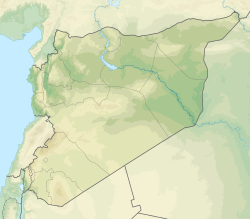Madaya, Syria
Madaya
مضايا | |
|---|---|
| Coordinates: 33°41′16″N 36°06′3″E / 33.68778°N 36.10083°E | |
| Country | |
| Governorate | Rif Dimashq |
| District | al-Zabadani |
| Subdistrict | Madaya |
| Elevation | 1,344 m (4,409 ft) |
| Population (2004 census)[1] | |
• Total | 9,371 |
Madaya (Arabic: مضايا, romanized: Maḍāyā) is a small mountainous town in Syria, located at an altitude of around 1,300 metres (4,300 ft).[2] It is located about 40 kilometres (25 mi) northwest of Damascus in the Rif Dimashq Governorate. According to the Syria Central Bureau of Statistics (CBS), Madaya had a population of 9,371 in the 2004 census.[1] Its inhabitants are predominantly Sunni Muslims.[3] Madaya is an important summer resort in Syria, along with the nearby cities of Zabadani and Bloudan. The town's population is estimated at 15,000 in 2015.[4]
The town's farms are famous for growing apples, cherries, peaches, as well as peaches, and the Barada River passes through it. It also has a number of springs and eyes that supply the town's needs, such as the Kawthar Spring and Ain Mayseh, which has made it a destination for many tourists coming from Damascus or from outside the country.[4]
Etymology
[edit]J. E. Hanauer said the name "Madaya" should be compared to the Greek mythological figure Medea.[5]
History
[edit]J. E. Hanauer visited Madaya around 1909. He saw villagers preparing for winter by drying tomatoes and wheat to make bulgur, and feeding sheep with leaves before slaughtering them for preservation as "kawarma".[5]
Syrian civil war (2015–2017)
[edit]Since July 2015, the town has been besieged by a combination of Syrian forces loyal to the Syrian president Bashar al-Assad and the allied Lebanese militia Hezbollah.[6] In December 2015, Doctors Without Borders reported that 23 people had died of starvation[7] after a total blockade prevented any food or humanitarian aid to enter since 18 October.[7] United Nations Secretary General Ban Ki-Moon expressed alarm at the situation in Madaya[8] as well as in other besieged areas in Syria, and warned that the use of starvation as weapon during conflict is a war crime.
On 7 January 2016, the UN Office for the Coordination of Humanitarian Affairs issued a statement[9] calling for unimpeded access to deliver emergency assistance to Madaya, Al-Fu'ah and Kafriya. Amid calls from United Nations officials[10] and dozens of humanitarian organizations[11] to intervene, the United Nations negotiated a deal between the Syrian government and rebels holding the town to allow for the delivery of humanitarian aid, which was carried out on 11 January 2016.[12]
On 14 April 2017, the 2015 Zabadani cease-fire agreement was implemented, and 60 buses transported 2,350 people, including 400 rebels, from Madaya and Zabadani to Idlib.[13]
Rehabilitation (2017–present)
[edit]In 2017, thousands of residents returned to the town after the reconciliation was completed, as all roads were opened, which facilitated the entry of technical and service workshops to the area.[14]
Local council began cleaning and restoring the paths, especially the tourist facilities, in addition to the return of electricity to the town. Madaya also returned as a tourist site for thousands of visitors, and the shops and the famous market were opened.[14]
References
[edit]- ^ a b General Census of Population and Housing 2004. Syria Central Bureau of Statistics (CBS). Rif Dimashq Governorate. (in Arabic)
- ^ "Madaya, Syria Page".
- ^ Robinson and Smith, 1841, vol 3, 2nd appendix, p. 146
- ^ a b ""Madaya" A Glorious History and a Prosperous Present/Archive - Tishreen newspaper".
- ^ a b Hanauer, J. E. (1909). "Notes from Damascus and the Anti-Libanus". Palestine Exploration Quarterly. 41 (2): 137. doi:10.1179/peq.1909.41.2.119. ISSN 0031-0328.
- ^ Khushbu Shah, Nick Paton Walsh and Peter Wilkinson, CNN (7 January 2016). "Madaya: Syria allows aid into besieged city - CNN.com". CNN.
{{cite web}}:|author=has generic name (help)CS1 maint: multiple names: authors list (link) - ^ a b "Siege and starvation in Madaya; immediate medical evacuations and medical resupply essential to save lives". Médecins Sans Frontières (MSF) International. Retrieved 2016-01-14.
- ^ Rivett-Carnac, Mark (15 January 2016). "U.N. Chief Warns Syria Starvation Is a War Crime". Time. Retrieved 2016-01-23.
- ^ Section, United Nations News Service (2016-01-07). "UN News - UN calls for humanitarian access to besieged areas in Syria, welcomes new approvals from Government". UN News Service Section. Retrieved 2016-01-14.
- ^ "Assistant Secretary-General for Humanitarian Affairs and Deputy Emergency Relief Coordinator, Kyung-Wha Kang Security Council Briefing on Syria, New York, 15 January 2016". ReliefWeb. Retrieved 2016-01-23.
- ^ "Joint statement: An appeal to end the suffering in Syria [EN/AR/FR/SP/RU/CH]". ReliefWeb. Retrieved 2016-01-23.
- ^ Kareem Shaheen (11 January 2016). "Trucks from aid convoy enter besieged Syrian town of Madaya". The Guardian. Retrieved 11 January 2016.
- ^ Nabih Boulos (14 April 2017). "Syrians leave family, memories behind as tens of thousands are evacuated in previously brokered deal". Los Angeles Times.
- ^ a b "A tour of the ministerial committee tasked with following up on the implementation of projects in the areas of Zabadani, Bloudan, Madaya and Baqin". SANA. Archived from the original on 7 October 2017.




